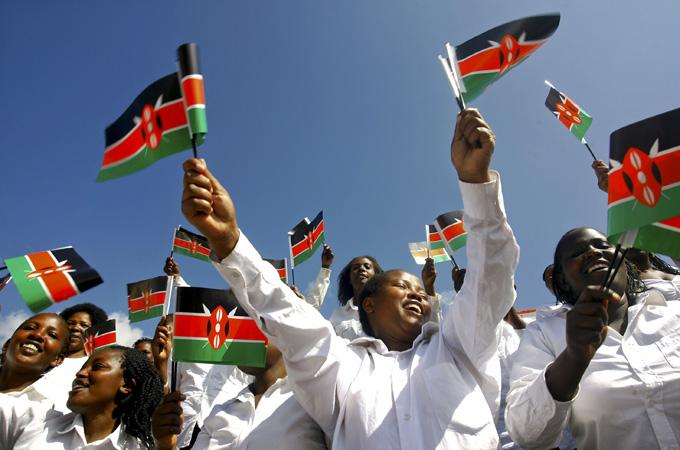[vc_row][vc_column][vc_column_text]Recently, Kenya’s opposition leader Raila Odinga withdrew from the second Presidential elections after concerns that they would not be credible. The first election that took place in August this year was deemed as highly democratic considering the nations recent tumultuous election history. With more organised vote counting, it looked likely that the incumbent President Uhuru Kenyatta would secure a majority win.
However, despite positive appearances on election day, Opposition leader Odinga accused Kenyatta of electoral rigging and the manipulation of votes, almost as a repeat of the 2007 elections, and encouraged supporters to protest using the slogan “no reforms, no elections”.
This led to an outbreak of electoral violence between supporters of Odinga and Kenyatta, with many injured and around thirty fatalities. The nation waited with baited breath whilst the IEBC investigated the claims, but Odinga’s announcement last Tuesday has sent the country into a state of unprecedented political crisis.
Odinga’s decision to drop out of the election re-run has seen the nation descend into chaos, not only leaving the IEBC with a very difficult decision regarding the scheduled election date but also heightening the tension between the supporters of Odinga and Kenyatta to boiling point.
No matter the country, an event like this would cause political and social unrest. However, for Kenya, this news is positioned against a long and complex backdrop of political instability and electoral violence, and threatens to tip the nation over the edge.
The 2007 elections, when Odinga first ran for presidency, is remembered in African history as a year of terrible electoral violence in Kenya which sent the country into its worse crisis for decades and led to the tragic killing of over 1,300 Kenyans. It is difficult to pin the blame for this catastrophe on one singular cause but the significance of ethnic tension and the use of ethnicity as a political tool to divide and rule in Kenya plays a huge part in why the nation struggles to be fully democratic.
Political leaders often come from different ethnic groups and make it their aim to provide solely for this group, thus creating tensions that are ready to explode at any point. The nation is also marred by another factors that disable democracy from flourishing, such as problems with electoral efficiency, accessibility of polling stations in rural areas and corruption of politicians, making it seem as if Kenya’s problems are simply unfixable.
Whilst over the past few years there have been efforts made to improve the political condition of the country, such as the creation of better electoral roles and vote counting as were seen in the August election, the nation appears to have an insurmountable list of problems to overcome, of which the withdrawal of Odinga from the electoral race has only added to.
So what can feasibly be done in order to restore higher levels of democracy and reduce electoral violence in Kenya? It appears to be a great task, as even formal institutional changes may not inhibit violence in the future. One change that can be enacted is reducing incentive to become an MP in Kenya. The financial incentives are huge, with a hefty pay slip of around £120,000, making it easier for individuals to enter politics with only their own personal interest in mind, something that will certainly not aid democracy.
It will be interesting to see whether Odinga re-enters the leadership contest in the near future, but whatever happens, the future of Kenya’s political and social stability appears very uncertain.
Martha Scott-Cracknell
(Photo courtesy of African Research Institute)[/vc_column_text][vc_raw_html]JTNDYmxvY2txdW90ZSUyMGNsYXNzJTNEJTIydHdpdHRlci10d2VldCUyMiUyMGRhdGEtbGFuZyUzRCUyMmVuJTIyJTNFJTNDcCUyMGxhbmclM0QlMjJlbiUyMiUyMGRpciUzRCUyMmx0ciUyMiUzRUVudm95cyUyMC0lMjAlMjYlMjMzOSUzQktlbnlhJTI2JTIzMzklM0JzJTIwY29uc3RpdHV0aW9uJTIwaXMlMjByZW1hcmthYmxlLi4uJTIwc29sdXRpb25zJTIwdG8lMjBLZW55YSUyNiUyMzM5JTNCcyUyMGN1cnJlbnQlMjBjaGFsbGVuZ2VzJTIwbXVzdCUyMGJlJTIwZm91bmQlMjBpbiUyMGl0cyUyMGNvbnN0aXR1dGlvbiUyQyUyMG5vdCUyMG91dHNpZGUlMjBpdCUyNiUyMzM5JTNCJTIwJTNDYSUyMGhyZWYlM0QlMjJodHRwcyUzQSUyRiUyRnQuY28lMkYybmZ4NHFPbmRPJTIyJTNFcGljLnR3aXR0ZXIuY29tJTJGMm5meDRxT25kTyUzQyUyRmElM0UlM0MlMkZwJTNFJTI2bWRhc2glM0IlMjBVSyUyMGluJTIwS2VueWElMjAlMjglNDBVS2luS2VueWElMjklMjAlM0NhJTIwaHJlZiUzRCUyMmh0dHBzJTNBJTJGJTJGdHdpdHRlci5jb20lMkZVS2luS2VueWElMkZzdGF0dXMlMkY5MjI0ODI1MjUzMjIzMzgzMDQlM0ZyZWZfc3JjJTNEdHdzcmMlMjU1RXRmdyUyMiUzRU9jdG9iZXIlMjAyMyUyQyUyMDIwMTclM0MlMkZhJTNFJTNDJTJGYmxvY2txdW90ZSUzRSUwQSUzQ3NjcmlwdCUyMGFzeW5jJTIwc3JjJTNEJTIyJTJGJTJGcGxhdGZvcm0udHdpdHRlci5jb20lMkZ3aWRnZXRzLmpzJTIyJTIwY2hhcnNldCUzRCUyMnV0Zi04JTIyJTNFJTNDJTJGc2NyaXB0JTNF[/vc_raw_html][/vc_column][/vc_row]

